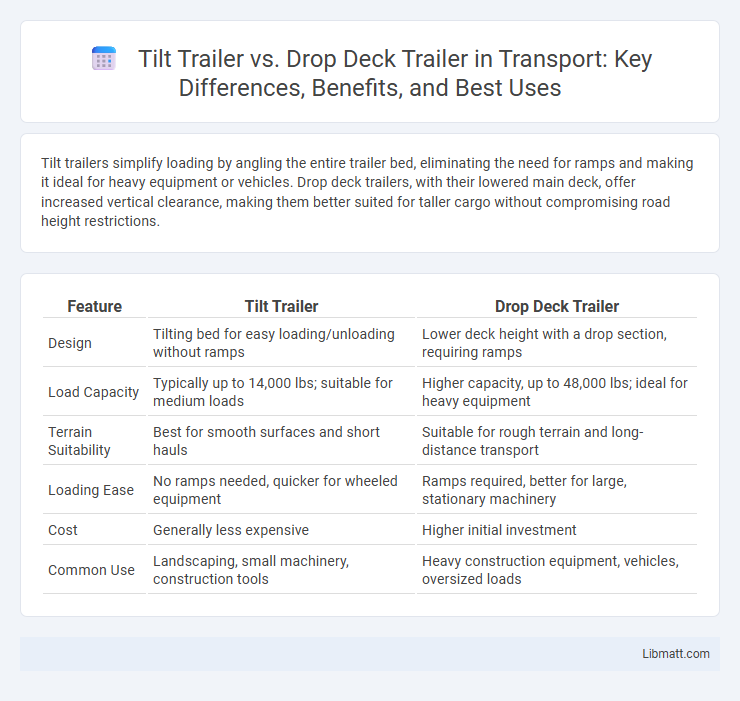Tilt trailers simplify loading by angling the entire trailer bed, eliminating the need for ramps and making it ideal for heavy equipment or vehicles. Drop deck trailers, with their lowered main deck, offer increased vertical clearance, making them better suited for taller cargo without compromising road height restrictions.
Table of Comparison
| Feature | Tilt Trailer | Drop Deck Trailer |
|---|---|---|
| Design | Tilting bed for easy loading/unloading without ramps | Lower deck height with a drop section, requiring ramps |
| Load Capacity | Typically up to 14,000 lbs; suitable for medium loads | Higher capacity, up to 48,000 lbs; ideal for heavy equipment |
| Terrain Suitability | Best for smooth surfaces and short hauls | Suitable for rough terrain and long-distance transport |
| Loading Ease | No ramps needed, quicker for wheeled equipment | Ramps required, better for large, stationary machinery |
| Cost | Generally less expensive | Higher initial investment |
| Common Use | Landscaping, small machinery, construction tools | Heavy construction equipment, vehicles, oversized loads |
Introduction to Tilt Trailers and Drop Deck Trailers
Tilt trailers feature a tilting bed that allows for easy loading and unloading of equipment by eliminating the need for ramps, making them ideal for transporting heavy machinery. Drop deck trailers, also known as step-deck trailers, have a lower deck height which provides extra clearance for taller loads while maintaining stability during transport. Understanding the key differences between these two trailer types helps you choose the right option based on your cargo size and loading requirements.
Key Differences Between Tilt and Drop Deck Trailers
Tilt trailers feature a hydraulic tilting mechanism that allows the entire deck to incline for easy loading and unloading of equipment without the need for ramps, optimizing efficiency for heavy machinery transport. Drop deck trailers have a lower deck height compared to standard flatbeds, providing increased vertical clearance and stability for taller or oversized loads while requiring ramps or lifts for loading. The choice between tilt and drop deck trailers depends on the specific cargo requirements, with tilt trailers excelling in simplicity and speed of loading and drop deck trailers offering better clearance and support for bulky items.
Loading and Unloading Mechanisms
Tilt trailers utilize a hydraulic mechanism that allows the deck to tilt, facilitating straightforward loading and unloading of equipment without the need for ramps. Drop deck trailers feature a lower middle deck height, enabling easier access for loading heavy machinery but typically require ramps or lift gates for efficient operation. Both trailer types optimize loading efficiency, though tilt trailers provide a more direct tilt-and-roll solution, while drop deck trailers rely on height clearance and accessory equipment.
Payload Capacity and Versatility
Tilt trailers offer greater versatility by allowing easy loading and unloading of equipment without ramps, making them ideal for transporting machinery with irregular shapes. Drop deck trailers provide higher payload capacity due to their lower deck height, enabling the transport of taller and heavier loads within legal height limits. Your choice depends on whether ease of loading or maximizing payload capacity is more critical for your hauling needs.
Safety Features Comparison
Tilt trailers offer enhanced safety with automatic tilt mechanisms that reduce manual handling risks during loading and unloading. Drop deck trailers provide lower deck heights, improving load stability and lowering the center of gravity, which minimizes rollover hazards. Your choice should consider these safety features to ensure secure and efficient transport tailored to your cargo needs.
Typical Applications for Each Trailer Type
Tilt trailers are commonly used for transporting heavy machinery, construction equipment, and vehicles that require easy loading and unloading without ramps. Drop deck trailers, also known as step deck trailers, are ideal for hauling taller and oversized loads such as industrial equipment, large crates, or building materials thanks to their lower deck height. Your choice depends on whether you need quick tilt access or extra vertical clearance for your cargo.
Maneuverability and Ease of Use
Tilt trailers offer superior maneuverability by allowing the trailer bed to tilt for easy loading and unloading, reducing the need for ramps and making it ideal for moving heavy equipment over uneven terrain. Drop deck trailers provide a lower deck height for carrying taller loads legally while maintaining stable handling during transport, but they may require ramps or lifts for loading. Your choice should consider the terrain and loading methods to ensure optimal ease of use and safe maneuvering.
Durability and Maintenance Requirements
Tilt trailers feature robust hydraulic systems that require regular maintenance to ensure durability under frequent loading and unloading stress. Drop deck trailers, constructed with reinforced steel frames, offer high durability with lower maintenance demands due to their simpler mechanical components. Both trailers require routine inspections, but tilt trailers typically incur higher upkeep costs due to hydraulic system wear and potential leakage issues.
Cost Considerations and ROI
Tilt trailers generally have a lower upfront cost compared to drop deck trailers, making them more accessible for smaller budgets. However, drop deck trailers often provide a better return on investment (ROI) due to their higher load capacity and versatility, reducing the number of trips needed. Your choice should balance initial expenses with long-term operational savings based on your specific hauling demands.
Choosing the Right Trailer for Your Needs
Tilt trailers offer easy loading and unloading by tilting the bed, making them ideal for transporting heavy equipment and vehicles on uneven terrain. Drop deck trailers provide a lower deck height, increasing cargo space clearance and accommodating taller loads, which is essential for hauling oversized or heavy machinery. Selecting the right trailer depends on your primary cargo type, loading requirements, and road clearance needs to ensure efficiency and safety.
tilt trailer vs drop deck trailer Infographic

 libmatt.com
libmatt.com